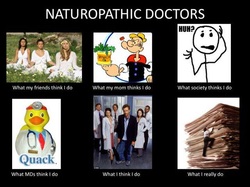 Photo credit: Alice Fong, ND, LMP, CC, CHt
Photo credit: Alice Fong, ND, LMP, CC, CHt by Dr. Deanna McCrary, ND
Recently the U.S. Senate declared October 7 through October 13, 2013, as ‘‘Naturopathic Medicine Week’’ to recognize the value of naturopathic medicine in "providing safe, effective, and affordable health care." Now that my profession has the official stamp of approval from at least one branch of the federal government, I hope it may serve as a springboard for the public to understand just what a naturopathic doctor is and does.
As the internet meme to the left humorously depicts, the public has many different perceptions of just what we do and who we are. Are NDs highly trained, serious medical professionals or voo-doo witchdoctors shaking gourds and throwing herbs on to a fire to heal the sick? Or some combination of both?
As much fun as I'm sure gourd-shaking can be, the naturopathic medical profession as it stands today aligns much more with the former than the latter. In fact, until the second or third year of naturopathic medical school, our requirements to enter the program and the basic science courses in years one to two are virtually identical to those of conventional medical school programs. [For a comparison of MD versus ND school curricula click here.] Our tools for diagnosing diseases are the same as an MD -- physical exams, clinical intakes, laboratory testing and imaging. Where we differ from MDs are in the areas of philosophy and treatments. Naturopathic medicine is rooted in the philosophy that the body can heal itself. However there are obstacles to cure -- habits and inheritances, mainly -- that need to be addressed to give the body the best chance it can have to heal itself. Activation of the vis medicatrix naturae -- the healing power of nature -- is one of the core principles upon which naturopathic medicine is based.
The other key area where naturopathic medicine differs from conventional medicine is in treatment. The primary tools in a conventional medical doctor's toolbox to treat disease are pharmaceutical drugs and/or surgery. While a naturopathic doctor undergoes years of training in pharmacology we have many more tools to work with -- herbal medicine, nutrition, hydrotherapy, homeopathy, mind/body medicine, counseling, vitamin and mineral supplementation, and physical medicine such as spinal adjustments and massage to name a few. While drugs or surgery may be options they are typically viewed as "last resorts" or only if it is the best choice for the presenting situation.
Other core principles of the naturopathic profession include:
First Do No Harm
Utilize the most natural, least invasive and least toxic therapies.
Identify and Treat the Causes
Look beyond the symptoms to the underlying cause.
Doctor as Teacher
Educate patients in the steps to achieving and maintaining health.
Treat the Whole Person
View the body as an integrated whole in all its physical and spiritual dimensions.
Prevention
Focus on overall health, wellness and disease prevention.
It should also be noted that NDs are trained to know their limitations and to refer out if something seems to be beyond our scope. As a primary care modality, the naturopathic profession is poised to provide a solid answer to our overburdened healthcare system in desperate need of primary care providers. There are currently 17 states plus the District of Columbia that license NDs as healthcare professionals able to diagnose and treat diseases. Licensing helps to protect the public from untrained persons declaring themselves as NDs and is vital to making our care available to all persons who are looking for healthcare solutions that feel authentic to them.
To learn more, please visit these links:
© Deanna McCrary, ND and LifeJOY Natural Medicine, 2013. Unauthorized use and/or duplication of this material without express and written permission from this blog’s author and/or owner is strictly prohibited. Excerpts and links may be used, provided that full and clear credit is given to Dr. Deanna McCrary, ND and LifeJOY Natural Medicine with appropriate and specific direction to the original content.
Recently the U.S. Senate declared October 7 through October 13, 2013, as ‘‘Naturopathic Medicine Week’’ to recognize the value of naturopathic medicine in "providing safe, effective, and affordable health care." Now that my profession has the official stamp of approval from at least one branch of the federal government, I hope it may serve as a springboard for the public to understand just what a naturopathic doctor is and does.
As the internet meme to the left humorously depicts, the public has many different perceptions of just what we do and who we are. Are NDs highly trained, serious medical professionals or voo-doo witchdoctors shaking gourds and throwing herbs on to a fire to heal the sick? Or some combination of both?
As much fun as I'm sure gourd-shaking can be, the naturopathic medical profession as it stands today aligns much more with the former than the latter. In fact, until the second or third year of naturopathic medical school, our requirements to enter the program and the basic science courses in years one to two are virtually identical to those of conventional medical school programs. [For a comparison of MD versus ND school curricula click here.] Our tools for diagnosing diseases are the same as an MD -- physical exams, clinical intakes, laboratory testing and imaging. Where we differ from MDs are in the areas of philosophy and treatments. Naturopathic medicine is rooted in the philosophy that the body can heal itself. However there are obstacles to cure -- habits and inheritances, mainly -- that need to be addressed to give the body the best chance it can have to heal itself. Activation of the vis medicatrix naturae -- the healing power of nature -- is one of the core principles upon which naturopathic medicine is based.
The other key area where naturopathic medicine differs from conventional medicine is in treatment. The primary tools in a conventional medical doctor's toolbox to treat disease are pharmaceutical drugs and/or surgery. While a naturopathic doctor undergoes years of training in pharmacology we have many more tools to work with -- herbal medicine, nutrition, hydrotherapy, homeopathy, mind/body medicine, counseling, vitamin and mineral supplementation, and physical medicine such as spinal adjustments and massage to name a few. While drugs or surgery may be options they are typically viewed as "last resorts" or only if it is the best choice for the presenting situation.
Other core principles of the naturopathic profession include:
First Do No Harm
Utilize the most natural, least invasive and least toxic therapies.
Identify and Treat the Causes
Look beyond the symptoms to the underlying cause.
Doctor as Teacher
Educate patients in the steps to achieving and maintaining health.
Treat the Whole Person
View the body as an integrated whole in all its physical and spiritual dimensions.
Prevention
Focus on overall health, wellness and disease prevention.
It should also be noted that NDs are trained to know their limitations and to refer out if something seems to be beyond our scope. As a primary care modality, the naturopathic profession is poised to provide a solid answer to our overburdened healthcare system in desperate need of primary care providers. There are currently 17 states plus the District of Columbia that license NDs as healthcare professionals able to diagnose and treat diseases. Licensing helps to protect the public from untrained persons declaring themselves as NDs and is vital to making our care available to all persons who are looking for healthcare solutions that feel authentic to them.
To learn more, please visit these links:
- The American Association of Naturopathic Physicians http://www.naturopathic.org/
- The Oregon Association of Naturopathic Physicians, http://www.oanp.org
- Based in Portland, Oregon, the National University of Natural Medicine (NCNM) is the oldest accredited naturopathic medical college in North America. It is also my alma mater! www.nunm.edu
- The Traditional Roots Institute, http://traditionalroots.org/
- Currently there are 7 accredited naturopathic medical colleges in North America. If you think a career in naturopathic medicine sounds intriguing, check out this ink: http://www.aanmc.org/
© Deanna McCrary, ND and LifeJOY Natural Medicine, 2013. Unauthorized use and/or duplication of this material without express and written permission from this blog’s author and/or owner is strictly prohibited. Excerpts and links may be used, provided that full and clear credit is given to Dr. Deanna McCrary, ND and LifeJOY Natural Medicine with appropriate and specific direction to the original content.

 RSS Feed
RSS Feed